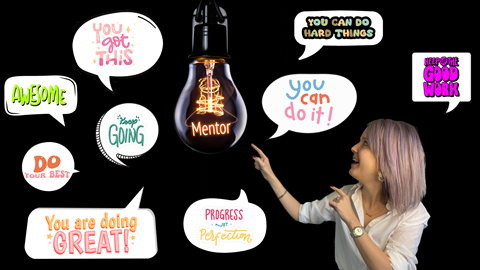A crucial factor that prospective PhD students often overlook when looking for a position is the choice of supervisor(s). The right supervisors can make the journey a time of growth and achievement, while the wrong ones can turn it into a nightmare. Isabelle Kohler gives you the key aspects to consider when choosing a PhD supervisor, emphasizing the importance of a good fit not only for a successful PhD, but also for continued mentoring throughout your career.
I often have conversations with Master students about their career aspirations. We discuss what they plan to do after their studies and how they envision their careers developing. One common question is whether they should pursue a PhD, and if so, what steps they should take.
When Master students express an interest in pursuing a PhD, their primary concern is usually about the topic of their research. Will they be passionate enough about it? This is a valid consideration, as a PhD student will spend several years (usually four, sometimes more) immersed in their chosen subject. However, while passion for the PhD topic is important, an equally important but often overlooked factor is the choice of supervisor.
From my own experience, I know how important the role of a good PhD supervisor can be. I was very lucky to have three supervisors who were not only brilliant and respected scientists, but also great mentors. Their support extended well beyond my PhD years: they are still guiding me after more than a decade and we still have projects togethers. I’m very grateful for their support and the way they trained me during my PhD.
PhD supervisors can make your journey one of growth and achievement or turn it into a nightmare if the relationship is poor, your supervisor is unsupportive, or creates a toxic environment. But how can you know beforehand what they will be like? What should you consider when choosing a PhD supervisor?
Here are some key aspects:
- Team of supervisors. In the Netherlands, PhD students generally have a team of supervisors consisting of one or two promoters (full professors or associate professors with the so-called “ius promovendi”, i.e., the right to act as promoters) and one or more co-promoters (often assistant or associate professors). Having a team of supervisors can enrich your research with different perspectives, but also requires excellent communication between all members (and you). Make sure you understand the roles and contributions of each supervisor. It will be crucial to a harmonious and productive PhD journey.
- Communication. Communication skills are probably one of the most important criteria when choosing your supervisors. Assess how well potential supervisors communicate. Are they prompt in responding to emails? Do they follow through on their commitments? A supervisor who is accessible and willing to engage in open dialogue will greatly enhance your PhD experience.
- Experience level. The experience level of your supervisors matters. Early- or mid-career supervisors may bring fresh ideas but may not have extensive supervisory experience. In contrast, senior supervisors have more experience but may be less available due to committee commitments.
- Commitment to PhD success. Investigate the track record of your potential main promoter regarding PhD completions. A committed supervisor will have a history of guiding students to successfully finish their PhDs (and ideally on time), reflecting their dedication and management capability.
- Mentoring skills. A supervisor’s mentoring skills go beyond research guidance. They should support your academic and personal development. Don’t underestimate the role of mentorship – not only during your PhD, but also in the next steps of your career. For instance, my PhD supervisor was the person that my current boss contacted as a reference when I applied for my current position. He also invited me to give a workshop at a conference he’s chairing later this year.
- Personality match. Compatibility between your personality and that of your supervisors can lead to a more harmonious working relationship. Consider how well you get along and whether you share similar values and work ethics. For example, if a supervisor expects you to work nights and weekends, but you value a work-life balance, this could lead to significant conflicts.
- Supervising style. Reflect on the supervisory style that suits you best. Some supervisors offer high independence and freedom, while others are more hands-on and want to closely monitor and guide your progress. Understanding your preferences will help you find a supervisor whose style aligns with your needs. Don’t hesitate to ask former or current PhD students on these aspects, or the supervisors directly during the interview.
- Networking opportunities. A supervisor with a strong network can be invaluable for your future career. Depending on your career plans, this can be particularly useful to check in advance. For example, if you are interested in an industrial career after your PhD, a supervisor with an industrial network will be very useful in providing introductions and opportunities that will support your professional development. Investigate your supervisor’s network through their website or list of publications.
Finding the right PhD supervisors is an important decision that can shape your academic journey and future career – sometimes even more than your PhD research topic. Therefore, take the time to evaluate potential supervisors on these aspects, and don’t hesitate to ask current or former PhD students for their opinion. Your choice will have a significant impact on your PhD experience and long-term success. Even if you have a great topic, a bad fit with your supervisors could turn your PhD into an unpleasant and draining experience. Take the time to choose wisely; your future self will thank you.
If you are interested in learning more about how to navigate academia and choose the right supervisor(s), do not hesitate to join the NextMinds Community! For this, you have plenty of choices: visit NextMinds website to learn more about my work, sign up for the newsletter, and follow me and NextMinds on LinkedIn.



















Nog geen opmerkingen